7





November 22, 2013 www.plaintalk.net
Plain Talk: Heritage Edition
B7
Gayville Hall provides n ROCKIN’
From Page B5
venue for area musicians
Editor’s note: Portions of
this story, written by Travis
Gulbrandson, first appeared
in the Yankton Press &
Dakotan on March 11, 2010.
GAYVILLE — When
Doug Sharples went to a
building auction in 1997, he
had no idea he would be the
one who came away with the
building.
He and his wife Judi were
friends of the previous
owner, who had passed away,
and Sharples said he went to
the auction strictly as a
spectator.
“They were trying to get
the first bid, and I just (rose
my hand) to bid on it, just to
get it going,” he said. “Then
there was no other bid. That
opening bid was below what
they would find acceptable,
so they told me what their
minimal would be, and it
was a darn good price.”
When he returned home,
Judi asked him, “Who
bought the building?”
“Guess what?” he told her.
“I did.”
The Sharples owned the
building for four years before
they ever thought to hold a
concert there. This was
because it was the home of a
grocery store, which closed
in 2001.
During this time, the
couple were making a film
about Omaha resident and
jazz musician Preston Love,
who died in 2004 and spent
his career playing with artists
like Count Basie and Ray
Charles. Love also performed
in smaller venues across the
Midwest.
“I thought to represent
that … I wanted to get him
playing in the hinterlands of
South Dakota, so I got him a
gig playing at the National
Music Museum, and then he
said, ‘I want to play
someplace at night,’” Doug
Sharples said.
The store had been
cleared out by that time and
the acoustics of the building
were good, so a stage was
built, and the concert was
held Wednesday, May 16,
2001. The show still remains
one of the Sharples’ favorites.
“It was quite an event,”
Judi Sharples said. “He was
wonderful.”
The show attracted
approximately 100 people,
and the Sharples decided to
hold another, this time with
John and Susan McNeill —
whom they met as students
at the University of South
Dakota — and Nick
Schwebach and Owen
DeJong.
Doug Sharples said the
next two shows both
attracted 83 people, and he
wasn’t sure if it would be
feasible to continue.
Then John McNeill
suggested hosting a
celebration of Hank
Williams.
“We had to turn away 50
people,” Sharples said. “We
had more than 200 people.”
“It was tremendous,” Judi
Sharples added. “The show
was so great.”
The Hank Williams show
was so successful that it’s
been performed again in
different versions through
the years. It will be
performed again this season
on March 27.
Doug Sharples said they
even called it, “The show that
saved Gayville Hall.”
Since that time, the venue
has hosted “celebrations” of
other artists, including
Johnny Cash and fiddler
Chet Olsen, which was
broadcast by South Dakota
Public Television.
These performances have
been among Gayville Hall’s
most popular.
“The most we ever had in
here was the first time we did
the Johnny Cash show. We
had 270 paid people in here.
It was just crazy,” Doug
Sharples said.
On average, most
performances attract more
than 100 people, although
some attract many more
than that.
“Our last show of the
season had 230 people in
here,” he said. “They were
even sitting in the aisle and
into the gallery.”
Sharples said the concerts
have attracted “a lot of
regulars” over the years, some
of whom travel long
distances to attend.
“We have customers that
come as far as 150 miles on a
fairly regular basis,” he said.
“Not every show, but they’ll
pick out four or five shows a
year and they’ll come that
distance.”
Apart from music, art is
also a very important part of
Gayville Hall. Its walls are
lined with posters from past
shows, vintage sheet music,
signage and albums.
There’s also a gallery that
features a revolving schedule
of art exhibitions.
Some works of art have
even been donated by
attendees of the concerts.
“At the Johnny Cash
show, there was a person in
the audience (April
Dawboy),” Judi Sharples said.
“We didn’t even know her.
And she came to us and said,
‘I was inspired by that
concert.’”
Since that time, Dawboy
has painted a number of
portraits of musicians, many
of which are on display in the
gallery.
“This is like an old-time
music hall,” Judi Sharples
said. “That’s what we aspired
to be. … It’s turned out that
there is a market, and people
do want to come and have a
wholesome and enlightening
evening. They sit and listen
to the music and interact
with the musicians, rather
than in a bar environment
where people are visiting and
the band is just in the
background.”
She added that neither
she nor her husband
anticipated such an enduring
response.
“When you think about
it, it’s pretty unbelievable that
we’re still here, that
something like this would
take off and grow,” she said.
“We have some really
wonderful patrons. It’s
exciting. They respond, and
we respond to them.”
Gayville Hall has featured
a great variety of music over
the years. Robin and Linda
Williams and Their Fine
Group, of Prairie Home
Companion and Grand Ole
Opry fame, are perhaps the
most widely known
musicians who have played
the hall, which they have
done twice. The South
Dakota Jazz Quintet, with
C.J. Kocher on saxes and
Dave Olson on piano, has
played four times. Other
favorites have included the
off-Broadway and former
Red Clay Rambler composer,
piano player, and singer,
Mike Craver, who has played
twice; the great guitar player
Harvey Reid; the North
Dakota troubadour Chuck
Suchy; old-time country
music stars Bob and Sheila
Everhart; Nashville singersongwriter Laurie McClain;
folk musicians Curtis and
Loretta, Bob Bovee and Gail
Heil; alternative country and
folk artist Joe West; singersongwriter Gordy Pratt; and
many others.
A very popular show in
2010 was the appearance of
the Rapid City-based Beatles
tribute band, Abbey Road.
Of course, Gayville Hall’s
“Fab Four” (John & Susan
McNeill, Owen DeJong, and
Nick Schwebach) continue to
be the main attraction at
Gayville Hall.
Any crowd of over about
160 persons appears to be a
full house at Gayville Hall,
and more than ten times
during the first five seasons
Gayville Hall had 200 or
more patrons. The biggest
crowd was about 270 persons
at the first presentation of "A
Celebration of Johnny Cash"
on October 15, 2003, when
an overflow crowd (at a
discounted ticket price for
the poor seats) sat in the
gallery and at the farthest
ends of the hall, where there
was hardly a glimpse of the
stage. The second largest
crowd, about 250, occurred
the second time that Gayville
Hall presented "A
Celebration of Chester
Olsen," in April of 2005. That
concert, which celebrated the
late South Dakota singer,
fiddler and instrument
maker and the old-time
fiddle music he loved, was
taped and broadcast in an
edited form as a TV special
on South Dakota Public
Television twice in 2005.
New, softer seats and
extensive renovations
featuring additional
restrooms were added to the
Hall in 2009. This change
reduced the number of seats
in the Hall, but made it more
comfortable for patrons.
serious about getting my
undergraduate degree, and
when I was working on my
graduate degree, I was
playing four nights a week
and studying at the same
time. It was grueling.”
In the early 1970s, he
decided to bring The
Chateaux Band back
together as a three piece
power group along with
two other members, Gary
Knutson on guitar and
Doug Test on drums. The
band eventually traveled to
Memphis, TN and recorded
the song “Reference Man”
on the Sun Records label. It
received national airplay on
stations in Oklahoma City,
OK, Little Rock, AK, and
most Top 40 stations
throughout the Midwest.
With success as
recording artists, The
Chateaux Band enjoyed
numerous sold out concerts
and dance engagements.
Letting go
Ellison never abandoned
his studies for he knew the
time might come to
eventually step away from
his role as a rock and roll
bandleader.
“I retired when I was
30,” he said. “I always had
this vision of Christmas
Day in a funky motel,
waiting to play the next gig.
I didn’t see myself fitting
that scenario so I pretty
much told myself if I make
it big by the time I’m 30,
great. And if not, I have a
great career to fall back on.”
Ellison’s life has more or
less played out just as he
had scripted it. During the
last few years of his band’s
existence, several
outstanding members
joined his group before
moving on to play with
national acts.
Mark Craney and Mike
Miller of Sioux Falls played
in the group and eventually
left to perform with
Santana, Deep Purple, and
Geno Vinelli.
The final members of
the group joining Ellison in
the mid-70s were Rusty Gill
In the mid-1960s, Ellison changed the name of The Shattoes
to The Chateaux Band. The band’s look changed along with
the times, adopting the clothing and hairstyles of that era. Pictured are Ellison, Doug Test, and Gary Knutson. Ellison and
Knutson both hailed from Vermillion; Test, from Mitchell, was
a classmate of Ellison’s at USD.
(Photo courtesy of Bob Ellison)
and Mike Yondrich from
Sioux City, IA.
After 14 years of musical
performances, with two
degrees from USD,
including a master’s in
medieval history, he
disbanded his rock and roll
group in 1976 and was
making plans to travel to
Connecticut to work on his
doctorate.
“I had my graduation
pictures developed at the
Gibson’s store in
Vermillion, which
eventually became Pamida,
and the manager there, who
I knew somewhat, asked me
what I was going to do
next,” he said.
When Ellison told him
about his plans to continue
his studies, the manager
asked him to consider
working for Gibson's.
Company officials in
Omaha, NE eventually
interviewed him. “I went to
work a couple weeks later,
and I never looked back.”
Ellison retired at age 54
after serving as Pamida’s
vice president of real estate
and new store
development. He now
devotes a few hours each
day to his work as a
commercial real estate
developer in Omaha.
He was thrilled when he
received the news in 2011
that his musical groups
were to be honored by the
South Dakota Rock & Roll
Music Association.
“It shows some thanks, I
guess, for all of the hard
work that you’ve put in,
and it’s a recognition of
being one of the better
bands during that era,”
Ellison said.
Interviewed before the
ceremony, he said he
planned to dust off his
guitar and perform five
songs at the ceremony. “It
will be a fun evening. The
group that I put together
are all either former
musicians or sons or
brothers of former
musicians who are no
longer with me,” Ellison
said.
-the home of old time musicThe Poker Alice
Band with
C.J. Kocher
For more information
about Gayville Hall, visit
www.gayvillehall.com.
The McNeills and Dan
Kilbride at “The Hay
Country Jamboree”
Through
Time...
The William F. Ludwig II Collection is donated
to the NMM in 2001, and includes historic
drums dating from the mid-19th to the mid20th century, collected by father and son,
William F. Ludwig Sr. and William F. Ludwig
II, over the course of approximately 90 years.
The 2005 gift of the D’Angelico, D’Aquisto, Gudelsky
Workshop is the focus of a major exhibition, “Great
American Guitars” (by D’Angelico, D’Aquisto,
Fender, Gibson, Martin, and Stromberg).
Josh Rieck and Jami
Lynn at “The Hay
Country Jamboree”
Gayville Hall is a live, old-time music venue started in 2001
which features many genres of music, including American
popular song, country, bluegrass, folk, and jazz. It is
located 14 miles west of Vermillion in Gayville.
Established in an 1879 mercantile building that had been
a general store or grocery for over 120 years, the hall
features a small, raised stage surrounded on three sides by
160 chairs. The acoustics of the room are wonderful, and
audiences and musicians love the hall’s intimacy and
simple setting. Most also love the fact that the hall is an
alcohol-and-smoke-free venue. Patrons come for our great
two-hour music shows and our family-friendly, old-time
atmosphere. An art gallery and displays of old sheet
music, antiques and historical artifacts, quilts, and
Americana dress up the hall. Come on over and see a show!
The Gayville Hall
Gazette.
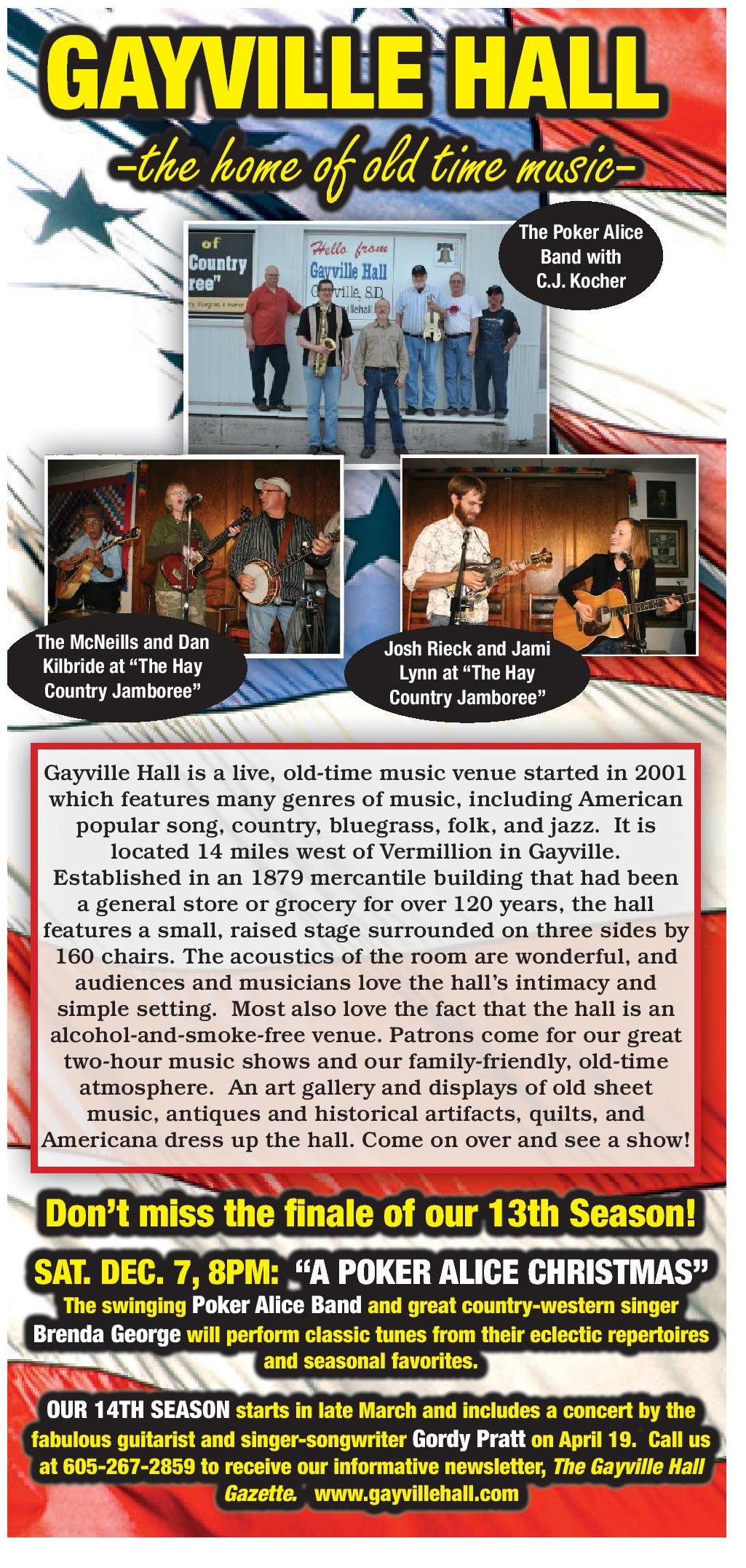
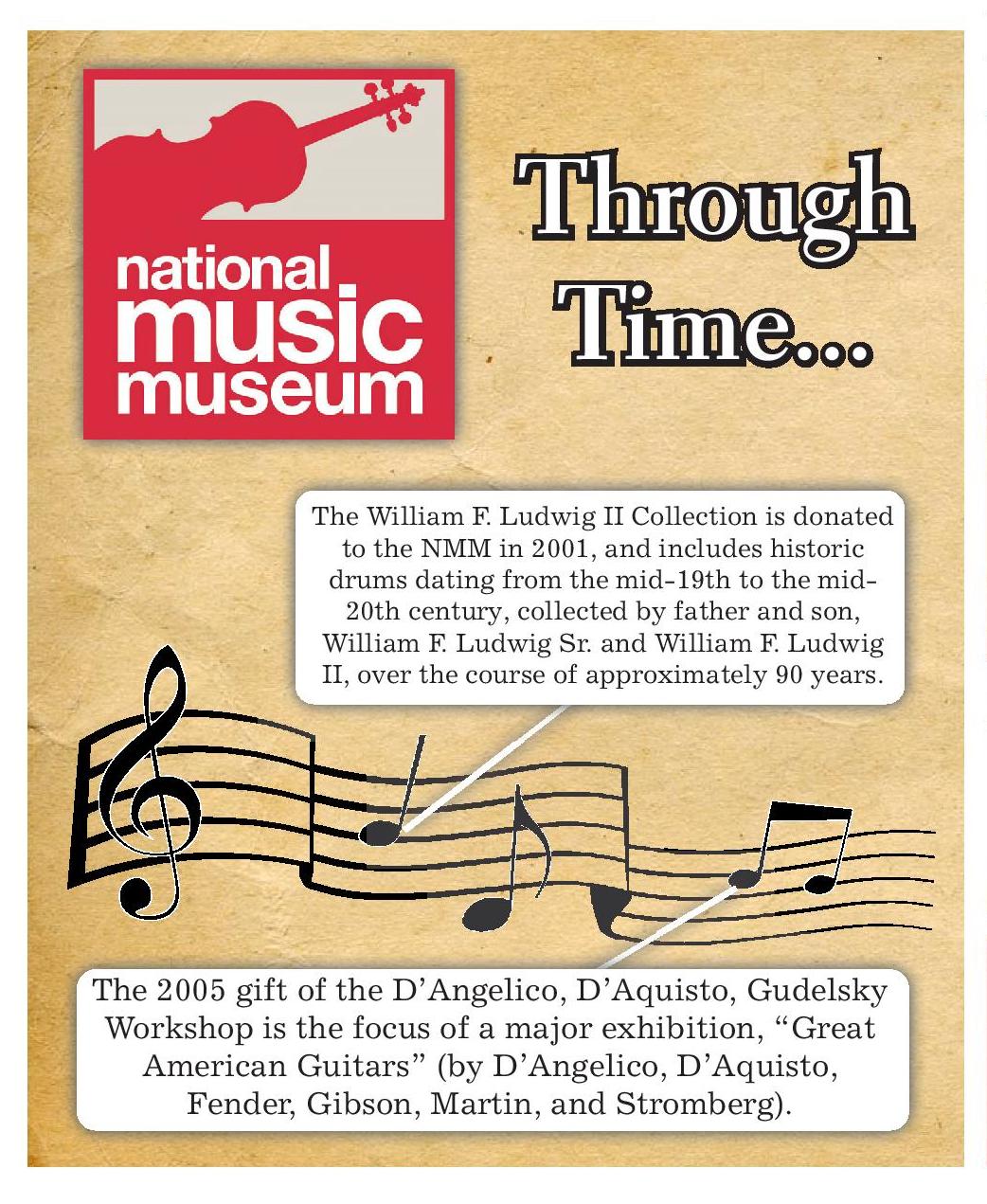




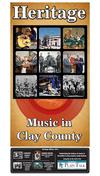
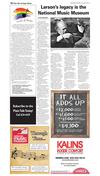
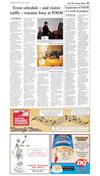
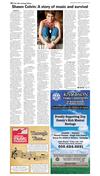
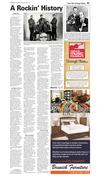
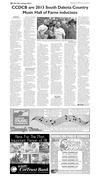
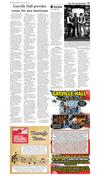
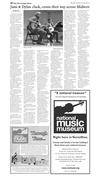
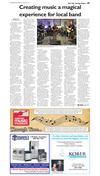
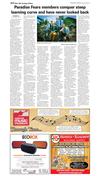
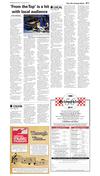
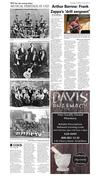
 Previous Page
Previous Page






